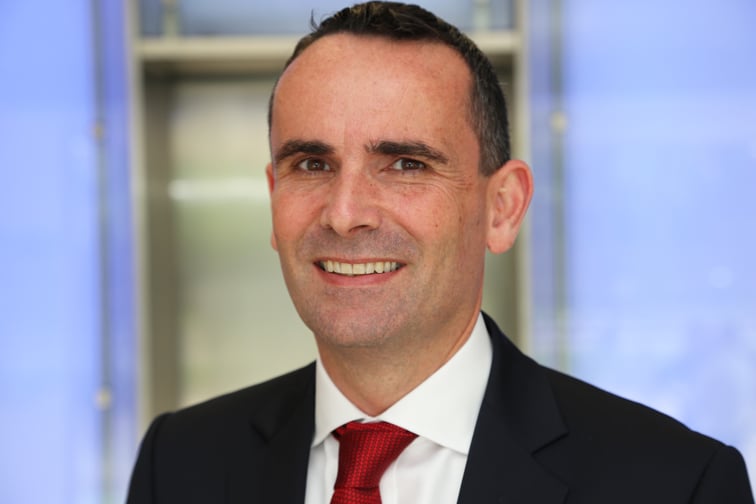

A common theme being discussed by wellbeing experts as COVID restrictions continue to relax incrementally across the UK is the sensation of ‘lost time’ as individuals reckon with the impact of the last two years. Yet as can be attested by many such specialists, no time is wasted that brings actionable lessons for the future and it is nigh on impossible to live and work through a year like 2021 without arriving at tangible conclusions.
Sharing some of the lessons that last year brought their respective organisations, Zurich UK’s head of retail Dave Martin (pictured above) and Markel UK’s sales and marketing director Nic Brown (pictured below) each emphasised the role that customer-centricity plays in establishing strong roots for the evolution of the insurance profession.
“Keeping customers at the centre of everything we do will always be a priority for our business and we will never stop working on this,” Martin said. “Equally, digital innovation must continue to drive sustainable propositions and solutions. This will ensure we provide a service which drives us forward in our sustainability journey as a business, while offering customers a service which matches their personal values.”
Stability and confidence of delivery remain key in building long term relationships, he said, and Zurich UK will continue delivering greater data insight at all points of the journey to ensure it can protect customer outcomes and meet their expectations.

Brown noted that last year re-affirmed that the insurance industry needs to get back to basics in order to build foundations for the future. The issues raised by the pandemic have given the industry a clear message, he said, which is that for the reputation of the sector to be enhanced, it needs to take a step back and ask itself whether the right building blocks are in place.
He highlighted that transparency and communication are vital. Customers need to know what the role of their insurer is, he said, and for Markel that role is clear – it is there to support them in times of unexpected risk and events. As such, the company needs to be clear on what it is prepared to cover, and how that cover will be delivered.
“This communication includes ensuring brokers and clients understand the price we are charging,” he said. “Consistency and sustainable pricing are vital, with brokers and their customers needing consistent premiums. Long-term relationships are built on that clarity: where the client is sure of the cover they have, the price they have paid and the certainty that their insurer will respond.
“Investment in people and AI to support our brokers and customers has proven its worth and will continue to do so. However, we also need to ensure we maintain the human touch. Our staff remain the most valuable part of our business, as they have proven so repeatedly throughout the pandemic.”
Having unpacked the key lessons that 2021 imparted to the insurance industry, Martin and Brown looked to what this year is likely to bring for the market, with Martin emphasising the role that sustainability will continue to play going forward. Sustainability was at the forefront of the industry’s agenda last year, he said, which is a trend that will quite rightly continue in the next 12 months, albeit at a far greater pace.
This doesn’t always have to be about huge strategic changes, he said, and if the industry as a whole instead thinks about it in terms of the smaller immediate adjustments, it will help to shift the dial. In addition, digital innovation will continue to open new markets, which in turn will bring new risks and exposures. This, he said, will require adaptation and agility from the industry in the coming months to service the business effectively.
“It will also need further investment in our technical and leadership capabilities to ensure we can continue to provide innovative solutions in a challenging risk environment,” Martin added. “In a market that has seen high levels of consolidation and change, it’s our ability to remain flexible and open to change, driven by the commitment to doing the right thing, that will make the difference in 2022.”
Also sharing his predictions, Brown noted that, as an industry, insurance needs to learn from the mistakes of the past and that failure to do so will deliver a huge blow to the future. Markel UK’s business is built on trust, he said, and so its clients have to trust the company will be there when it is needed.
“If we lose that trust, we lose our business,” he said. “The industry needs to ensure premiums are reasonable and aligned to risk. We cannot afford to plunge into a price war which ultimately erodes customer value as terms and conditions are tightened to make ends meet by non-specialist insurers and MGAs.
“We are committed to our specialist sectors for the long term at Markel UK and we hope the market makes that same commitment. There is a need for consistency as capacity to exit and enter markets in the hunt for quick profits or market share does nothing for the industry or the customers it serves.”
Brown also highlighted the role that sustainability plays for Markel as a business and that it was a central issue for the company in 2021, which saw it lead the conversation at industry events and media panels. For the sake of its customers, he said, Markel hopes that 2022 proves to be the year the industry takes a more responsible approach to this important issue.
Despite Omicron, he said, Markel and many others in the market are expecting an accelerated economic recovery and there is likely to be significant investment in digital technology. For Markel, however, the balance between digital and the human touch must always remain.
“Many insurers have also announced the move to a hybrid working system for staff,” he added. “That will require additional technology, systems and new ways of management and training to ensure staff feel they can still progress their career despite not being in the workplace five days a week – something Markel will be commenting on in the coming weeks.”
